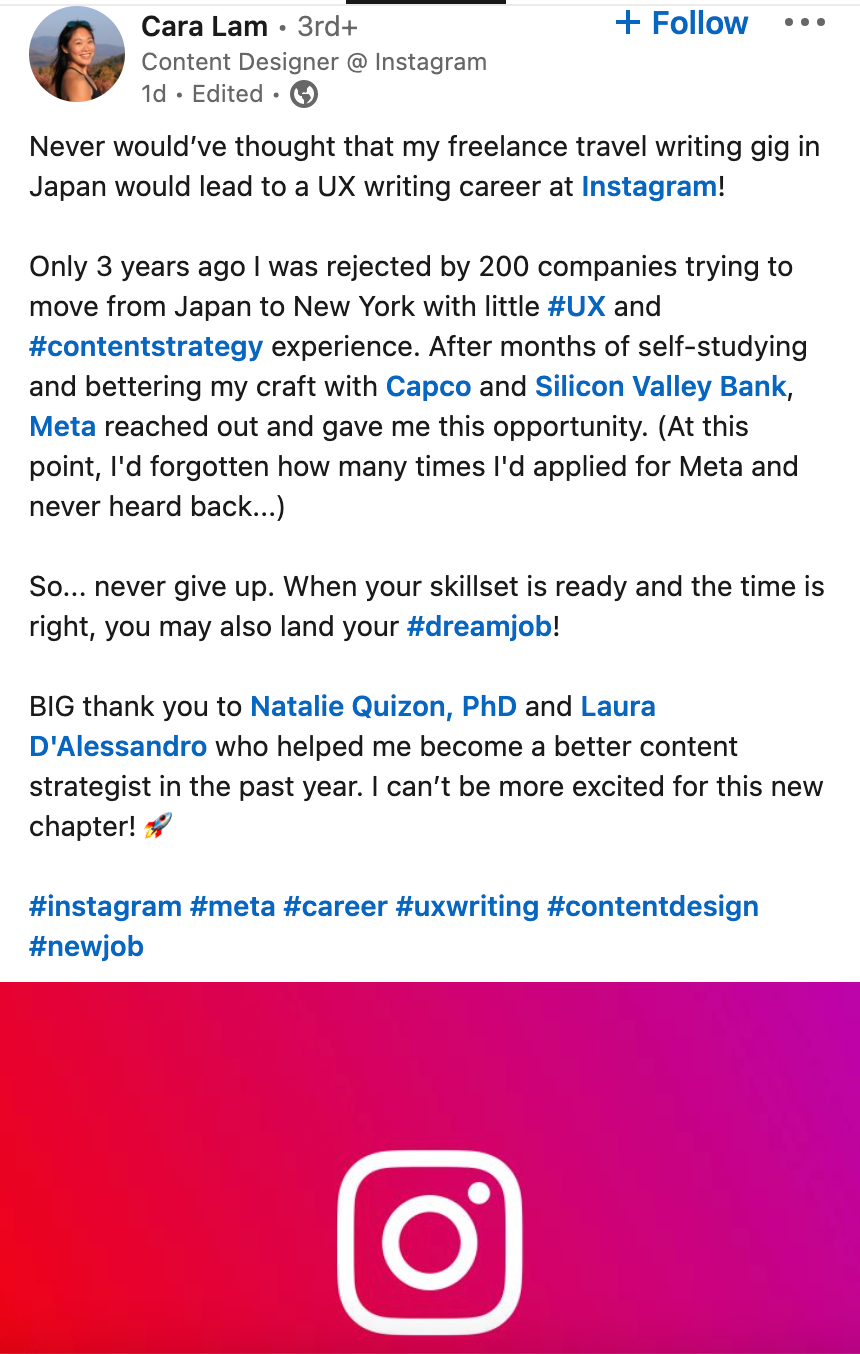In the second week of January 2021, all three of my freelance retainer clients let me go. Almost overnight, my monthly income plummeted from $5,000 to zero. It seemed insultingly serendipitous, how all three peeled away at once. Let’s not sugarcoat it—it felt like rejection.
Whether it’s a minor inconvenience or a major incident, the emotional wound of rejection runs deep. We’ll chase a blossoming opportunity only to be met with the thorns of refusal. And the resulting sting is gut-wrenching.
Yet rejection isn’t inherently negative. It’s our interpretation of it that determines whether it becomes an opportunity or an obstacle. And in my case, with careful reframing, losing those three clients was one of the best things to have happened to me.
Why rejection hurts—and how we internalize it
There’s no downplaying the agonizing shame and embarrassment rejection can bring forward. fMRI studies have shown that feelings of rejection piggyback off the same neural pathways that stimulate physical pain. In fact, one study even found that taking Tylenol can reduce the emotional pain rejection evokes. So, maybe pop a couple if you receive that dreaded “we need to talk” text. (Kidding.)
Scientific research aside, our mainstream culture sees failure and rejection as two sides of the same coin. If you’re skipped over for a promotion, you’ll tell your coworkers how your boss “rejected” you or how you “failed” to be considered.
We’ll start to believe it’s because we lack something. This is why we obsess over rejection—it gives our ego a reason to compulsively think about itself. Was I not smart enough? Why did she get the promotion instead of me?
Taking rejection personally stops us from growing
Rejection can be an opportunity to reflect, a sign of growth, and a marker of success. But our knee-jerk interpretation of rejection enshrouds it with negativity.
For example, when we tell ourselves that…
-
Rejection is to be avoided → We pre-reject ourselves. We’re dodging a bullet, right? But this means pre-rejecting ourselves—avoiding applying to jobs, not proposing new initiatives at work or asking someone out—before they even have the chance to say no.
-
Rejection happens to us → The world is out to get us. When we feel as though rejection is unfair, we’ll feel like victims. But in reality, life isn’t out to purposefully hurt us—it’s completely indifferent. This neutral mentality is key in helping us continue to take brazen chances.
-
Rejection is permanent → We stop trying. When we tell ourselves rejection is everlasting, we close ourselves off from future similar opportunities. But just because you were rejected from a specific opportunity—for example, a role at your dream job—doesn’t mean your chances are shot forever. Cara Lam is a shining example of this.

Why rejection has *very* little to do with you
It’s hard to not take rejection personally. The key is to reign in our emotions by the application of reason. Here are three reasons that rejection isn’t usually as serious as it appears.
1. It’s a method of communication
If we look past the emotional pain, rejection communicates a message. Blogger Amy Tang explains what this message contains: “It is simply information regarding compatibility between you and what you were rejected from.”
What do you do with this information? Well, that’s up to you. But at face value, rejection is just information regarding compatibility. Take MIT’s announcement as to why they’re re-instituting the SAT/ACT requirement after a short hiatus: research showed them that standardized tests accurately predicted student academic success at MIT.
Here’s what they said about the change:
”When we talk about evaluating academic readiness for MIT, that doesn’t mean we are measuring your academic potential, or intrinsic worth as a human. It only means that we are confident you, at this specific moment in your educational trajectory, can do well in the kind of hard math and science tests demanded by our unusual education.”
If you’re rejected by MIT due to SAT/ACT scores, it communicates simple information: your quantitative skills are a mismatch with MIT. Nothing more, nothing less.
2. Our internal narrative isn’t the truth
In our minds, the world revolves around us. We filter every interaction through our perspective. If someone rejects you, they must think poorly of you. But news flash: we have zero idea what others are thinking.
Brianna Wiest, the author of 101 Essays That Will Change the Way You Think, explains: “We assume that people think the way we do—because our internal narrative and process of the world is all we know.” In reality, there are a million things going on that we won’t see.
We’ll see the job rejection. But we won’t see how the company had an internal hire they’d been working with for weeks. We’ll see the “Read at 8:52 p.m.” notification. But we won’t see how the other person is driving and can’t text back right away.
3. Rejection addresses only a sliver of our identity
Rejection can trigger us to re-evaluate our entire self-esteem. But rejection only addresses a small portion of who we are. Let’s say you propose a new initiative at work and your boss passes up on it. It was your idea that was measured and evaluated, not your entire intrinsic worth as a human.
How to reframe rejection as an opportunity—not an obstacle
With careful reframing, rejection can be one of the most constructive things you can experience. Even when you might have lost three retainer clients in one week—like yours truly.
See rejection as a sign of growth
Were you recently rejected? Amazing! This is a sign that you’re advancing in life. Because if you’re not experiencing occasional rejection, you’re avoiding change (and staying stagnant).
Consider how rejection signals that you’re going after opportunities. The world won’t give you opportunities—you have to go out there and ask for them.
When my three retainer clients dropped off, it had to do with the fact that I went after retainer agreements. As a freelancer, I was eager to find sustainable income, and retainers were a fantastic solution. Sure, it didn’t work out. But it was a sign I was experimenting with something new that could suit me and my business’s needs better.
Not to mention, rejection is a sign of healthy resistance. For example, if people reject your rates for your services, it could be an indicator that your prices are perfect. You shouldn’t appeal to everyone.
See rejection as a learning opportunity
You might not notice it right away, but rejection is a rich learning opportunity.
You can use it to collect data about a specific situation. Let’s say you’re in the thick of the job search and send out your resume to 20 companies—only to hear back from one.

What would happen if instead of lamenting over your unreturned calls, you tweaked your resume? Would the outcome change? Treat rejection like a data point, make necessary adjustments, then continue running your experiment.
Rejection is also an opportunity to improve. It all begins with asking, “why not?” No, this doesn’t mean being hell-bent on changing someone’s mind. Instead, it’s about understanding the reasoning behind a decision, so you can use it to improve in the future.
Rejection worked for me
After my three clients left me in the dust, I took a step back to analyze the situation.
At the time, I was on the precipice of burning out. I was clocking in ten-hour workdays, and it was (understandably) putting a strain on my interpersonal relationships. Past the shame of rejection, another feeling materialized: relief.
I took a few weeks off to recuperate and recover. Once I had, I asked my clients what happened. It turned out, none of it was personal: one had a dwindling budget, another a dramatic brand pivot, and the third, a new in-house hire. (And even if it had been personal—say, negative feedback on my writing—it would still have been a learning opportunity to improve my craft.)
My ex-clients weren’t indicative of my intrinsic self-worth. But this rejection provided me the opportunity to update my onboarding process, cold-pitch new clients, and take a much needed break.
Plus, good or bad, it’s all material. Proof: the rejection resulted in this article.
[adsanity_group align=’alignnone’ num_ads=1 num_columns=1 group_ids=’15192′]
Need Any Technology Assistance? Call Pursho @ 0731-6725516







